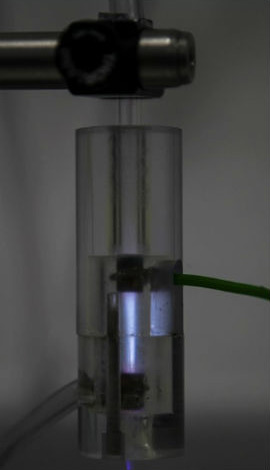 A recent publication in the British Journal of Cancer describes the first ever preclinical use of low temperature plasmas (LTPs) on normal and healthy prostate cells. LTPs are created by the breakdown of a gas following the application of a high electric field across the gas. This process induces the concentrated production of reactive oxygen and nitrogen species, which under specific conditions cause oxidative DNA damage and cellular necrosis. Scientists from the University of York’s Plasma Institute and Cancer Research Unit collaborated to investigate the potential of LTPs as a novel therapy for prostate cancer.
A recent publication in the British Journal of Cancer describes the first ever preclinical use of low temperature plasmas (LTPs) on normal and healthy prostate cells. LTPs are created by the breakdown of a gas following the application of a high electric field across the gas. This process induces the concentrated production of reactive oxygen and nitrogen species, which under specific conditions cause oxidative DNA damage and cellular necrosis. Scientists from the University of York’s Plasma Institute and Cancer Research Unit collaborated to investigate the potential of LTPs as a novel therapy for prostate cancer.
The researchers compared treatment efficacy on healthy prostate cells and cancerous prostate tumor cells obtained from a single patient and maintained in culture. The study showed that LTPs cause significant DNA damage and a subsequent reduction in the ability of cells to form colonies, thereby inducing necrotic cell death and mitigating tumor growth. Most conventional treatments, such as photodynamic and radiation therapy, induce apoptotic cell death and are associated with disease recurrence and treatment resistance. The current study provides important proof of principle for additional investigation of LTPs as a viable alternative for focal treatment of early stage organ confined prostate cancer.
Some details from the study abstract:
Method: The cytopathic effect of low-temperature plasma was first verified in two commonly used prostate cell lines: BPH-1 and PC-3 cells. The study was then extended to analyse the effects in paired normal and tumour (Gleason grade 7) prostate epithelial cells cultured directly from patient tissue. Hydrogen peroxide (H2O2) and staurosporine were used as controls throughout.
Results: Low-temperature plasma (LTP) exposure resulted in high levels of DNA damage, a reduction in cell viability, and colonyforming ability. H2O2 formed in the culture medium was a likely facilitator of these effects. Necrosis and autophagy were recorded in primary cells, whereas cell lines exhibited apoptosis and necrosis.
Conclusions: This study demonstrates that LTP treatment causes cytotoxic insult in primary prostate cells, leading to rapid necrotic cell death. It also highlights the need to study primary cultures in order to gain more realistic insight into patient response.
Study in British Journal of Cancer: Low-temperature plasma treatment induces DNA damage leading to necrotic cell death in primary prostate epithelial cells
Source: University of York
The post Low Temperature Plasmas for Prostate Cancer Therapy appeared first on Medgadget.
